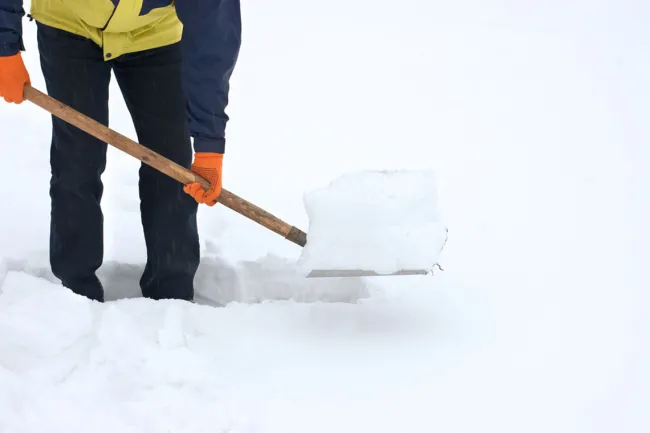School kids (and a lot of employees!) across the Northeast are enjoying the snow brought by Winter Storm Niko on Feb. 9.
However, the snowstorm has been severe enough to provoke blizzard warnings and the cancellations of thousands of flights across the Northeast. Both Boston and Philadelphia have declared snow emergencies, and the Mayor of New York City has urged residents to avoid going outside, describing the storm as “unusually fast and intense.”
As our offices in Philly, New York and Boston dig out of almost a foot of snow, we urge those in the area to be careful.
Most of us know that heavy snow and high winds make travel tricky and driving dangerous, but it’s harder to remember to be cautious when walking, especially in metro areas where a lot of retailers operate as if it’s business as usual.
While some businesses opt to give their employees a day off, others want to capitalize on the fact the competition may be closed. Unfortunately, sometimes that means that they’re not doing a thorough enough job of ensuring their premises are safe for their customers and workers.
How Bad Was Winter Storm Niko?
The storm resulted in heavy accumulations of snow from central and eastern Pennsylvania, much of New Jersey, and much of New England.
Almost 4,000 flights across the country were canceled because of Niko, according to flight-tracking website FlightAware.com, including more than 300 flights in both LaGuardia and Logan Airports.
In New York City, where 14 inches of snow are expected in total, Mayor Bill de Blasio stated that road crews began laying down salt and clearing snow in the city at 3 a.m. on Thursday. If they absolutely had to go out, he asked residents not to use cars. Outside of the city, especially on freeways, blizzard-like conditions make for unsafe travel. A winter storm warning is in effect until 6 p.m.
Philadelphia is expected to see up to eight inches. As a safety measure, the Pennsylvania Turnpike lowered its speed limit to 45 miles per hour, according to the Associated Press, and most of the flights from Philadelphia International Airport were canceled.
The snow started on Thursday morning in Boston, but the city is expected to get 18 inches or more by the end of the day. The Governor of Massachusetts also urged people to stay off the roads.
Despite government caution and calls for road safety in all three cities, many businesses remained open, leaving people the option to venture outside.
Liability in Ice and Snow Slip and Falls
If you live in Boston, New York, or Philadelphia, and have to go outside, be careful. Winter storm Niko resulted in very fast accumulation of snow, and high winds are still spreading that snow and making travel treacherous.
If you’re going shopping, be especially careful.
Retail store owners, restaurant owners, and even homeowners have a legal obligation to clear ice and snow from their parking lots and sidewalks. If they don’t, they can be held liable for injuries under premises liability laws.
Although business are not required to shovel snow while snow is still falling, once the storm ends they are responsible for clearing the snow within a reasonable time period.
And although not shoveling during an ongoing storm may be excused, businesses are not off the hook for things like leaky drain pipes or dripping rooftops if they are the causes of an icy walkway. Property owners are also required to salt walkways, entranceways, driveways and parking lots in a timely manner to prevent unsafe conditions as a result of melting and refreezing.
Different states have varying statutes on what a reasonable time period is. In Massachusetts and New York, for example, that time is within four hours if snowfall ceases between 7 a.m. and 5 p.m. In New York City, business owners have more time if snowfall ends in the evening.
If you are legally on the property and a business owner was negligent, meaning they did not take action to prevent or eradicate a dangerous condition that resulted in your injury, you may have a slip and fall case.
What to Do If You Hurt Yourself in a Slip and Fall
If you slip and fall, injuring yourself, the most important thing is receiving medical attention immediately. This is especially important for people who are particularly vulnerable to serious injuries after a fall, such as [senior citizens][3]. Call 911, and stay where you are if possible. If you need to move to a safe area, have a witness help you.
If you can, take pictures of the scene or ask someone to take them for you. These are key for documenting possible negligence on the part of the property owner for failing to clear ice or snow.
It’s extremely important to contact an attorney as soon as possible after a slip and fall injury; an experienced attorney is essential to securing a fair verdict in these types of cases, where changes in legislation have had an adverse effect on the rights of victims.
Our attorneys at Morgan & Morgan understand that a slip and fall can result in injuries with lasting consequences, and our ability to prove liability in slip and fall cases has led to many successful settlements and verdicts. If you’ve been injured, fill out our free and confidential case evaluation form today.
